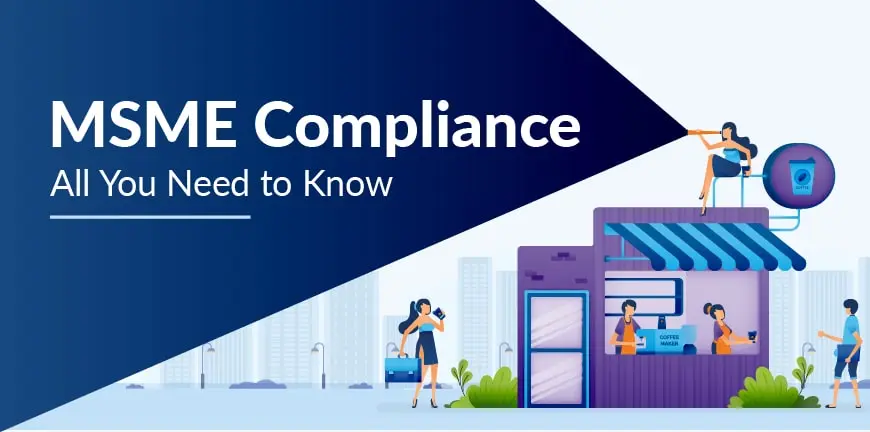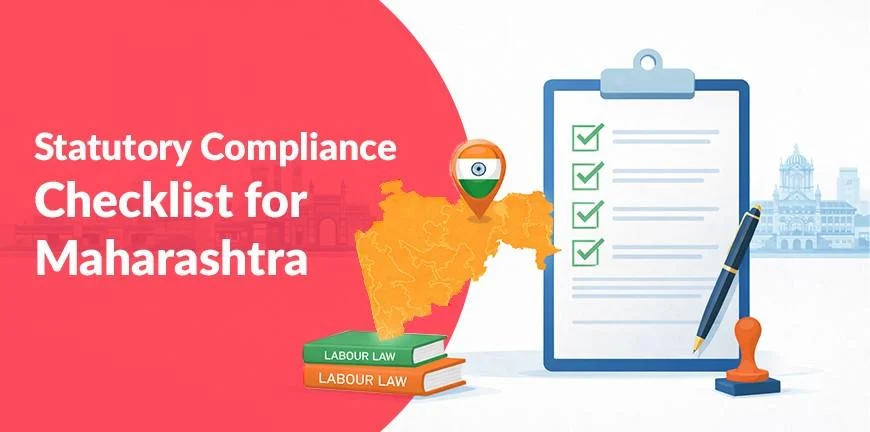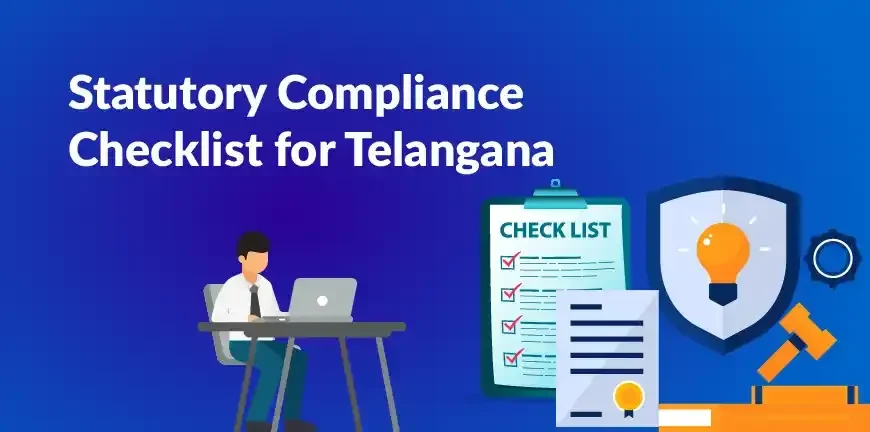
Growth of EV Stations and What it Means for the EV Industry
26/09/2024
6 Types of Payroll Partners: How to Choose the Right One?
30/09/2024- How Are Companies Classified under the MSME Act 2026?
- What are the different types of companies?
- Why is MSME Compliance Important?
- What Are the MSME Compliances in India?
- What Are the Penalties or Risks of Non-Compliance for MSMEs?
- How to Ensure MSME Compliance (2026 Checklist)?
- Why Do You Need an MSME Compliance Partner?
- Key Takeaways
- Frequently Asked Questions (FAQs)
“Culture and compliance are the foundation upon which great companies are built.”- Mary Barra, CEO, General Motors.
You may be a micro, small, or mid-sized enterprise, or even if you are a large MNC operating in India, compliance is unavoidable. When you comply with the laws and regulations, you stand a better chance of securing subsidies from the government and uninterruptedly maintaining your business. Let’s discuss MSME compliance in detail and help listed companies gain valuable insights about how to achieve the best outcomes.
How Are Companies Classified under the MSME Act 2026?
Companies are classified in several ways and using various terminologies. As a business, under one method of classification, you could be classified as a small business, a mid-sized business, or a large business, depending on the number of employees. Your business could also be a private or public company, based on ownership. The MSME Act 2026, however, classifies companies as micro, small, and mid-sized enterprises and sets MSME compliance requirements accordingly.
The latest MSME Classification (effective 1 April 2025) based on Enterprises in Manufacturing and Services Segments is listed below:
| Category | Investment Limit (₹) | Turnover Limit (₹) | Definition |
| Micro | Up to ₹ 2.5 crore | Up to ₹ 10 crore) | A very small enterprise eligible for MSME benefits and designated support. |
| Small | Up to ₹ 25 crore | Up to ₹ 100 crore | A growing enterprise still qualifies under the MSME category for support. |
| Medium | Up to ₹ 125 crore | Up to ₹ 500 | A larger business within MSME limits, eligible for supportive schemes. |
What are the different types of companies?
Companies are classified in several ways and using various terminologies. As a business, under one method of classification, you could be classified as a small business, a mid-sized business, or a large business, depending on the number of employees. Your business could also be a private or public company, based on ownership. The MSME Act, however, classifies companies as micro, small, and mid-sized enterprises and issues compliance that them must manage.
MSME Classification Based on Enterprises in Manufacturing and Services Segments
1. Micro
Investment: Less than INR 1 Crore
Turnover: Less than INR 5 Crores
2. Small
Investment: Should not exceed INR 10 Crores
Turnover: Should not exceed INR 50 Crores
3. Medium
Investment: Should not exceed INR 50 Crores
Turnover: Should not exceed INR 250 Crores
Why is MSME Compliance Important?
1. Legally Safe
Compliance is a legal requirement, and every MSME business must be compliant. Otherwise, it could invite huge fines and legal action, leading to business disruption.
2. Building Credibility
Compliance helps MSMEs build trust with investors and other stakeholders, increasing their credibility as a business and improving their brand reputation.
3. Helps Create a Level Playing Field even at Lower Levels
Since medium, small, and even micro businesses are subject to appropriate compliance, it helps create a level playing field even for small and mid-sized companies.
4. Ensuring Timely Payments
Compliance can also help ensure that MSME suppliers receive their payments on time. The MSME Form-1 is a way for clients to report their timely payments owed to registered MSME companies.
5. Growing Exports
MSME Compliance can also help MSMEs grow their exports by having all the necessary documents like invoices, packing lists, and other documents in place. These documents certify that the exporter is compliant with all regulations in India and in the country they are exporting.
What Are the MSME Compliances in India?
The MSME compliances and MSME vendor compliances that you should be aware of are:
- All MSMEs operating in India must follow a specific type of compliance, as specified by the laws of the government and other states.
- Section 9 of the MSMED Act specifies how the MSME Form 1 must be filled out and states that the said form should be filed on time.
- MSME Form 1 details must be submitted to the Central Ministry every 6 months if you have MSME suppliers.
- A director/CEO/CFO can digitally sign the MSME Form 1 if they are authorized by the company to do so.
- DIN details for the director, manager, CEO, and CFO must be provided. The PAN card details must also be submitted.
- For suppliers, the FYI form, due date, and the amount due, etc., must be provided on time to the authorities.
What Are the Penalties or Risks of Non-Compliance for MSMEs?
The risks of non-compliance are many for MSMEs and for those who have MSME vendors. Here they are:
1. Operational Risks
Non-compliance might mean disruptions to operations, either because of legal action by authorities or disapproval from stakeholders involved.
2. Government Penalty
The MSME would need to pay a penalty for the non-compliance, which would be a hefty sum of money.
3. Legal Prosecution
Non-compliance can also lead to legal prosecution by someone who is affected by the lack of compliance or has a special interest in the case.
4. Loss of Brand Reputation
There is also the risk of such non-compliance affecting the brand reputation, leading to negative discussions on social media.
5. Financial Burden
If you do not pay your employees on time, then you will have to compensate them adequately later. This means overdue wages and additional pay that you may need to pay them.
How to Ensure MSME Compliance (2026 Checklist)?
Here is a comprehensive MSME compliance checklist companies can use to ensure 100% MSME compliance in 2026:
1. Verify MSME Registration under Udyam Portal
Ensure your business& all eligible vendors are registered on the Udyam Registration Portal. This official recognition enables MSMEs to access government incentives, credit facilities, & legal protections under the MSMED Act. Moreover, regularly verify vendor MSME certificates to confirm authenticity & eligibility before initiating business transactions.
2. Adhere to the 45-Day Payment Rule
The MSMED Act mandates that payments to MSME suppliers be made within 45 days from the date of delivery or service completion. Additionally, delays attract compounded interest on pending amounts. Implement automated reminders and approval workflows within your finance systems to ensure payments are processed promptly & avoid legal or reputational risks.
3. File MSME Form 1 on Time
Every company must file MSME Form 1 with the Ministry of Corporate Affairs (MCA) when payments to MSMEs remain unpaid for more than 45 days. The filing should include invoice details, due dates, and reasons for delay. Moreover, timely submission promotes transparency & protects businesses from scrutiny or penalties under the Companies Act.
4. Maintain Accurate Transaction Records
Keep meticulous records of all MSME-related transactions, including contracts, invoices, delivery notes, and payment confirmations. These records serve as proof of compliance during audits or inspections. Implement digital documentation systems to ensure easy tracking, retrieval, & verification of financial data linked to MSME dealings.
5. Conduct Regular Compliance Audits
Schedule periodic internal or external compliance audits to assess adherence to MSME obligations. These audits should verify timely payments, accuracy in filings, and consistency with government guidelines. Early identification of gaps helps prevent penalties & ensures continued access to MSME-related benefits and credibility.
6. Train Finance & Procurement Teams
Educate your accounts, procurement, & legal teams on the latest MSME regulations, documentation standards, and filing deadlines. Regular training helps staff identify potential compliance risks early and fosters a proactive compliance culture. Also, include compliance of MSME in onboarding & refresher programs to maintain awareness.
7. Partner with a Compliance Management Expert
Collaborate with a professional compliance management agency like ALP Consulting. Experts help automate processes, monitor regulatory changes, and ensure end-to-end MSME compliance. Their guidance minimizes operational risks, prevents delays in filings, & allows businesses to focus on growth while maintaining 100% compliance confidence.
Why Do You Need an MSME Compliance Partner?
An MSME compliance partner will help ensure that your MSME compliance is on track, firstly by updating the compliance policies within the company to reflect the changes made by regulatory authorities and by documenting and training your employees on compliance, in addition to management itself.
Partner with Alp Consulting today to simplify MSME compliance, avoid costly penalties, and focus on growing your business with complete peace of mind. Here’s how ALP Consulting is the best-suited MSME compliance partner:
1. Expertise in Indian Regulatory Frameworks
Alp Consulting brings deep experience in managing MSME, labour, and corporate compliances, ensuring complete adherence to evolving government laws and deadlines.
2. Automated Compliance Tracking Systems
Using advanced compliance management tools, Alp automates reminders, filings, and audit tracking. This minimizes manual errors and ensures on-time submissions.
3. Dedicated MSME Compliance Specialists
A team of trained compliance experts continuously monitors regulatory updates, helping your business stay ahead of statutory obligations and prevent penalties for non-compliance with MSME Form 1.
4. End-to-End Documentation Support
From vendor verification to Form 1 filing and payment records, ALP ensures seamless documentation and transparent reporting to authorities.
5. Customized Compliance Strategies
ALP tailors MSME compliance solutions based on industry type, size, & regional requirements to align with your organization’s goals.
6. Proven Record of Trust and Excellence
With nearly 3 decades of experience and a strong reputation across industries, ALP Consulting has helped hundreds of companies maintain 100% compliance with confidence and efficiency.
Key Takeaways
- MSME compliance ensures legal protection, timely payments, and eligibility for government incentives and financial benefits.
- Filing MSME Form 1 and adhering to the 45-day rule are crucial compliance requirements.
- Non-compliance can lead to severe penalties, reputational damage, and loss of business credibility.
- Regular audits, digital documentation, & employee training help maintain consistent MSME compliance.
- Partnering with experts like ALP Consulting ensures complete compliance management, accuracy, and operational efficiency.
Frequently Asked Questions (FAQs)
1. What is MSME compliance?
Adhering to the laws and regulations set by both state and central governments is called MSME compliance. The laws are laid down separately by both the state and central governments.
2. What is the penalty for non-compliance with MSME?
Non-adherence to the laws and regulations set by the state and central governments can lead to severe penalties, such as fines and legal action, which could disrupt the business.
3. Which business comes under MSME?
Several businesses across industries can be considered MSMEs. Some of the industries that MSMEs can belong to are food and beverages, manufacturing, services (both IT and non-IT), and healthcare and wellness.
4. How to file MSME Form 1 online?
File MSME Form 1 via the MCA portal by logging in, selecting the form, uploading the mandatory details, and submitting digitally.
5. Why hire a compliance partner?
A compliance partner like Alp Consulting ensures timely filings, accuracy, and risk reduction, preventing penalties while allowing businesses to focus on core operations.
6. What is the 45-day rule for MSME?
Buyers must pay MSME suppliers within 45 days of receiving goods or services to prevent interest penalties.
7. How to check MSME compliance?
Businesses can verify MSME compliance via MCA records, Udyam registration data, and regular audit reviews of payments and filings.
8. What is MSME compliance for audit?
MSME compliance for audit ensures timely payments, accurate recordkeeping, & adherence to government guidelines under the MSMED Act, 2006.
Contact Us For Business Enquiry

Hariharan Iyer
Hariharan Iyer is the Vice President – Operations at ALP Consulting, bringing over 40+ years of experience in HR outsourcing and labour law compliance. He leads end-to-end HRO operations, ensuring process efficiency, statutory compliance, and seamless service delivery for clients across industries. With a strong background in labour law governance and workforce management, Hariharan plays a key role in driving operational excellence and compliance-led HR solutions at ALP Consulting.




